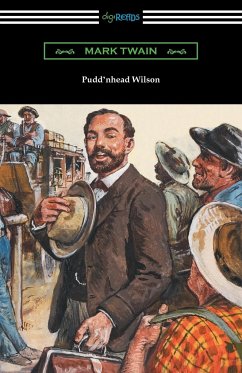
Pudd'nhead Wilson
Versandkostenfrei!
Versandfertig in 1-2 Wochen
10,99 €
inkl. MwSt.

PAYBACK Punkte
5 °P sammeln!
First serialized in "The Century Magazine" between 1893 and 1894, Mark Twain's "Pudd'nhead Wilson" is a murder mystery set before the American Civil War in Missouri, more specifically, in a town on the banks of the Mississippi River. During infancy, a light-skinned black baby and a white-skinned baby were switched at birth by a slave mother. Because the black baby grows up thinking he is white, he is highly racist toward his slaves. The white baby, who thinks he is a slave, grows up with no guidance and makes a living stealing, drinking, and doing other immoral things. During a murder trial, t...
First serialized in "The Century Magazine" between 1893 and 1894, Mark Twain's "Pudd'nhead Wilson" is a murder mystery set before the American Civil War in Missouri, more specifically, in a town on the banks of the Mississippi River. During infancy, a light-skinned black baby and a white-skinned baby were switched at birth by a slave mother. Because the black baby grows up thinking he is white, he is highly racist toward his slaves. The white baby, who thinks he is a slave, grows up with no guidance and makes a living stealing, drinking, and doing other immoral things. During a murder trial, the town lawyer Puddn'head Wilson, who is seen as a peculiar fellow by the townsfolk, is able to expose the boys' true identities. "Puddn'head Wilson" is a story carried by themes of racism, Southern customs, and questions of identity. On the surface it is a witty and satirical tale but as one digs deeper a biting social commentary of racial inequality can be found. This edition is printed on premium acid-free paper.















